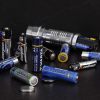
UK Encourages Smarter Recycling to Reduce Waste-Related Fires
The United Kingdom is responding to a problem with waste-related fires, mainly associated with the improper recycling of lithium-ion batteries. Due to its exothermic nature in 2023, these batteries were connected to 1,200 and more fires in waste collection vehicles and recycling facilities. Such incidents produce damage to infrastructure and potential threats to workers and firefighters.
Disposable vapes, which contain lithium-ion batteries, are often treated as normal household waste yet they aren’t. When this waste is collected and accumulated in waste collection vehicles, the compaction can compact the batteries hence creating a fire.
Due to features, such as a high energy density, these batteries must be treated properly, charged and stored adequately, equipped with lithium battery packaging to avoid short circuits, leakage or fire. This packaging is meant to reduce certain risks in most cases using materials that are insulating or have a fire resistant nature.
The study by Material Focus shows that only 17% of disposable vapes are recycled, and around five million vape disposals are chucked per week in the UK. This continues to fuel the impact of fire risks and environmental impact.
To combat this, authorities encourage people to follow the standard practices for dealing with lithium batteries disposal or recycling. These batteries should not be disposed of with your ordinary household trash but rather should be handed over to recycling centres equipped to handle them without compromising the environment. The chance of encountering fire incidents due to waste could be minimized if only people were made more aware of the proper ways of recycling their waste materials.
Due to these challenges, the following regional initiative has been developed across the UK. In London alone, the Fire Brigade has responded to more than 200 cases of fire involving lithium batteries in the past two years. To this end, councils such as Newham are advising its inhabitants to take these items to special collection centres or to return them to retailers. The awareness campaigns are also ongoing, and recycling details are displayed on bin lorries.
Similarly, in East Devon and West Berkshire have joined other councils to provide kerbside battery recycling facilities. For safety purposes, the residents should dispose the batteries in clear plastic bags placing them on the bins for safe collection. This initiative also extends to small electrical items and gas canisters, to reduce more fire risks from improper disposal by the public.
Further still, in Cambridgeshire, the Greater Cambridge area has recorded seven bin lorry fires in 2024. Local authorities are calling for the imposition of communal battery and small electronic items recycling centers. Such measures illustrate the efforts being done to improve safety and promote environment standards in various areas.
It is through the combined effort of the councils, waste management companies, and residents that the UK aims to reduce waste fire incidents and encourage proper disposal.














